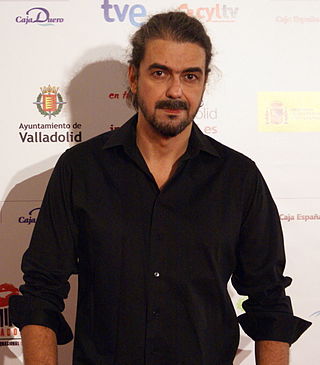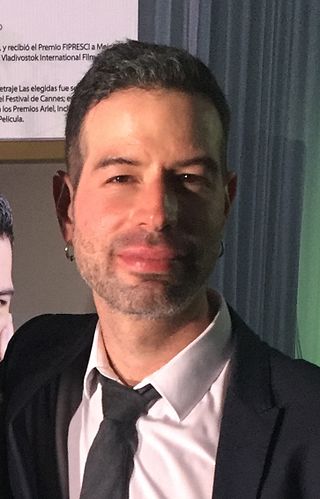Related Research Articles

Cinema of Colombia refers to film productions made in Colombia, or considered Colombian for other reasons. Colombian cinema, like any national cinema, is a historical process with industrial and artistic aspects.
Tomás Gutiérrez Alea was a Cuban film director and screenwriter. Gutiérrez Alea wrote and directed more than twenty features, documentaries, and short films, which are known for his sharp insight into post-Revolutionary Cuba, and possess a delicate balance between dedication to the revolution and criticism of the social, economic, and political conditions of the country.

Luis García-Berlanga MartíMMT was a Spanish film director and screenwriter. Acclaimed as a pioneer of modern Spanish cinema, his films are marked by social satire and acerbic critiques of Spanish culture under the Francoist dictatorship. These include Welcome Mr. Marshall! (1953), which won the International Prize at the 1953 Cannes Film Festival, Plácido (1961), nominated for an Academy Award for Best Foreign Language Film in 1962, and The Executioner (1963), winner of the FIPRESCI Prize at the 24th Venice International Film Festival He kept a long-time collaboration with screenwriter Rafael Azcona, with whom he co-wrote the scripts for seven of his films between 1961 and 1987.

Isabel Coixet Castillo is a Spanish film director. She is one of the most prolific film directors of contemporary Spain, having directed twelve feature-length films since the beginning of her film career in 1988, in addition to documentary films, shorts, and commercials. Her films depart from the traditional national cinema of Spain, and help to “untangle films from their national context ... clearing the path for thinking about national film from different perspectives.” The recurring themes of “emotions, feelings, and existential conflict” coupled with her distinct visual style secure the “multifaceted ” filmmaker's status as a “Catalan auteur.”

The Havana Film Festival is a Cuban festival that focuses on the promotion of Latin American filmmakers. It is also known in Spanish as Festival Internacional del Nuevo Cine Latinoamericano de La Habana, and in English as International Festival of New Latin American Cinema of Havana. It takes place every year during December in the city of Havana, Cuba.

Fernando León de Aranoa is a Spanish screenwriter and film director.
Michael Victor Sporn was an American animator who founded his New York City-based company, Michael Sporn Animation, in 1980, and produced and directed numerous animated TV specials and short spots.

Chilean cinema refers to all films produced in Chile or made by Chileans. It had its origins at the start of the 20th century with the first Chilean film screening in 1902 and the first Chilean feature film appearing in 1910. The oldest surviving feature is El Húsar de la Muerte (1925), and the last silent film was Patrullas de Avanzada (1931). The Chilean film industry struggled in the late 1940s and in the 1950s, despite some box-office successes such as El Diamante de Maharajá. The 1960s saw the development of the "New Chilean Cinema", with films like Three Sad Tigers (1968), Jackal of Nahueltoro (1969) and Valparaíso mi amor (1969). After the 1973 military coup, film production was low, with many filmmakers working in exile. It increased after the end of the Pinochet regime in 1989, with occasional critical and/or popular successes such as Johnny cien pesos (1993), Historias de Fútbol (1997) and Gringuito (1998).

Antonino Isordia Llamazares is a Mexican film and documentary director known for making documentary films in a more cinematic style. His films have been shown at International Film Festivals and received awards in his native Mexico, Argentina, Austria, Canada, Chile, Colombia, Cuba, France, Germany, Spain, and the United States. He has had a documentary feature film and a documentary short each nominated for Ariel Awards.
The Cine Las Americas International Film Festival is an annual film festival based in Austin, Texas, featuring Latine and indigenous films from the Americas and the Iberian Peninsula. Patrons of the festival are offered a wide variety of films to choose from including narrative and documentary features, short films, music videos, films made in Texas, and youth films. Discussions and networking with visiting filmmakers, parties, and resource fairs are also featured throughout the 5-day event.

Tami Kashia Gold is a documentary filmmaker, visual artist and educator. She is also a professor at Hunter College of the City University of New York in the Department of Film and Media Studies.
Igor Begelman is a virtuoso clarinet player. He has performed solos with a number of orchestras. He also plays chamber music, and is a member of the TAGI ensemble.

Jomí García Ascot was a poet, essayist, filmmaker, director and educator. Born in Tunisia, he was a Spanish exile who lived in Mexico.
Cristina Ibarra is an American documentary filmmaker who currently lives in Brooklyn, NY. She was a Rauschenberg Fellow, Rockefeller Fellow, a New York Foundation for the Arts Fellow, and a MacArthur Fellow.

David Pablos is a Mexican director, editor and screenwriter. An active filmmaker since 2007, Pablos has been involved in six feature films, including shorts and documentaries. Pablos attained recognition for directing La Vida Después (2013) and Las Elegidas (2015).

Marcela Zamora Chamorro is a Salvadoran born-Nicaraguan documentary director and journalist. She has worked in El Salvador, Nicaragua, Mexico, Venezuela, and Cuba.

Ernesto Daranas Serrano is a Cuban filmmaker. Daranas' three feature films have had unprecedented success in Cuba and were submitted to the Academy Award for Best International Feature Film. Daranas is a Latin Grammy nominee for Best Long Form Music Video and a recipient of the King of Spain Award. His filmography includes Sergio & Sergei (2017), starring Ron Perlman, and Behavior, often considered the greatest Cuban film of the 21st century.
The Havana Film Festival New York (HFFNY) is a film festival, based in New York City, that screens cinema from across Latin America with a special focus on Cuba and its film industry. It is a project of The American Friends of the Ludwig Foundation of Cuba, a 501(c)(3) tax-exempt organization with the mission of building cultural bridges between the United States and Cuba through arts projects.

Habaneceres is a Cuban documentary film, directed in 2001 by Luis Leonel León. The documentary received awards at film festivals and was selected by the Cuban Film Press Association, affiliated with the International Federation of Film Press (FIPRESCI), as the best film of 2001 in its genre.

The 20th Santiago International Film Festival (SANFIC), organized by Fundación CorpArtes, took place from August 18 to 25, 2024.
References
- ↑ Jose Martinez "Film opens Saturday in Bronx" Daily News Sunday, April 22, 2001
- 1 2 3 Cassandra Lizaire "Filmmaker Celebrates Cuban Tradition, Receives Arts Award," Norwood News June 28, 2007 http://www.norwoodnews.org/id=625&story=filmmaker-celebrates-cuban-tradition-receives-arts-award/
- ↑ "11th Cine Las Americas Winners" "11 th Cine las Americas Winners". Archived from the original on 2012-03-27. Retrieved 2011-07-16.
- ↑ Bronx Council on the Arts (list of 2010 BRIO winners) http://www.bronxarts.org/awardee_all.asp?SelCategory=15:2010&selSubcategory2=2 Archived 2011-07-25 at the Wayback Machine